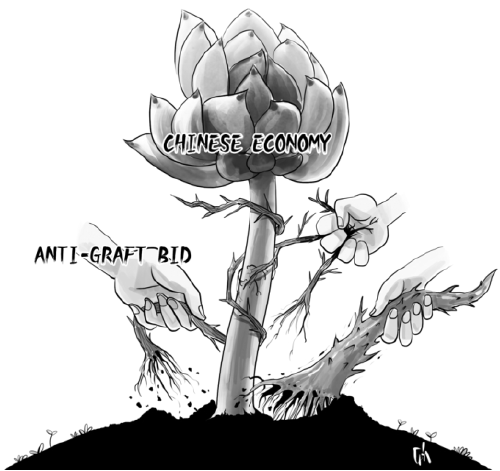Anti-graft storm propels growth in long run
Updated: 2016-02-15 08:06
By Ji Naili(China Daily)
|
|||||||||
 |
|
CAI MENG/CHINA DAILY |
During my trip to a coal-producing province, I found that officials at a road checkpoint played cards and the loser paid by working extra hours instead of handing over money. Before 2012 it was just the opposite - they quarreled with each other in order to work extra hours.
The reason for their change is simple: in the past they could ask coal truck drivers for bribes, a practice which has been stopped with the implementation of the anti-graft campaign in October 2012.
They are only a few of the officials "discouraged" from "working hard" by the anti-corruption drive. In the past, many officials were busy promoting local GDP growth through programs like realty or polluting industries that made immediate returns, because these programs promised promotion or other rewards for them. However, corruption often happened in the process due to the lack of effective regulation over power. As the pressure upon corruption has increased, many officials have tended to change their highly risky practice and opt for safety first.
Another cause of the inactivity of officials is the cancelling of some hidden sources of income for them. Exactly like in the above-mentioned case, many officials who only received average pay were rather "hardworking" because that meant they could get grey income, such as bribes. Now, with their grey income gone, officials tend to be less active. And the blurring of officials' job responsibilities makes things worse because they find it easy to push the job to one another without being punished.
Both the abnormal activeness and laziness of officials are caused by lack of regulation over their power in hand. So the officials that would be overactive in the past when there was profit made from development programs, are lazy at present when there is not.
Theoretically, officials deserve some fair promotion or other encouragement when they do boost local economic growth. Officials are mortals, too, and they have their own pursuits. The key problem is to prevent officials from abusing their power in hand and violating residents' rights or interests for their own illicit profits. The healthy mode is: when an official boosts growth he or she gets promoted, and when he or she obtains illicit money in the process there will be certain, inescapable punishment.
In the last months of 2015, the central authorities began striking at the "laziness of officials" and amended the Party regulations so that lazy officials will be punished. That move shows the top leadership's determination to solve the problem by regulating power and we expect more moves this year.
A wider concern about the laziness of officials is: does it have a negative effect upon the economy?
That worry is unnecessary, because true prosperity can never be based on corruption, which is a kind of social injustice. When bureaucrats get rich at the cost of benefit to the public, it discourages ordinary people from working hard, thus widening the social gap and curbing economic growth in the long run.
In some states in Africa and Central Asia, for example, where officials lead luxurious lifestyles paid for with illicit income while the residents remain rather poor, economic growth is rather slow. In nations with clean politics, such as North Europe, they enjoy prosperity even amid bad natural conditions. Clean politics enables the residents to get their fair share from economic growth, and encourages them to work harder to support the growth.
Clean politics also promotes economic growth by cutting unnecessary costs. Without bureaucrats illicitly profiting from businesses, the whole society saves costs and cultivates mutual trust. That also enables businesspersons to better trust each other in their dealings, which also helps propel the economy. Therefore it is not necessary to worry about economic growth being curbed - the anti-graft storm will only promote it in the long run.
The author is a professor at Zhou Enlai School of Governance, Nankai University.
Related Stories
'Unexpected' investigation shows anti-graft move has zero tolerance 2016-01-29 07:58
Party watchdog's openness is helpful to anti-graft campaign 2016-01-18 08:22
China's top legislature vows strengthened anti-graft efforts 2016-01-16 04:44
Anti-graft drive supports resilient growth 2016-01-12 08:12
Today's Top News
Inspectors to cover all of military
Britons embrace 'Super Thursday' elections
Campaign spreads Chinese cooking in the UK
Trump to aim all guns at Hillary Clinton
Labour set to take London after bitter campaign
Labour candidate favourite for London mayor
Fossil footprints bring dinosaurs to life
Buffett optimistic on China's economic transition
Hot Topics
Lunar probe , China growth forecasts, Emission rules get tougher, China seen through 'colored lens', International board,
Editor's Picks

|

|

|

|

|

|







